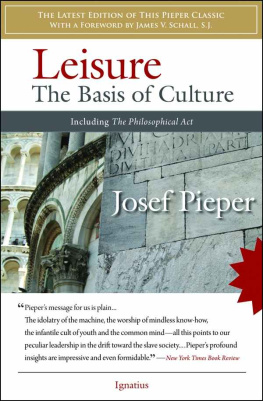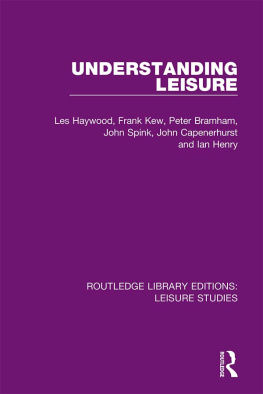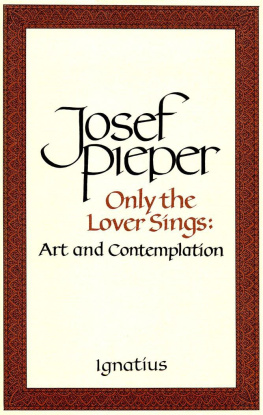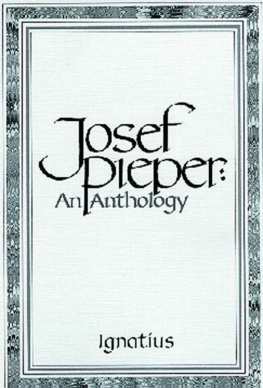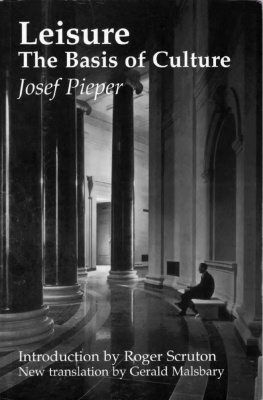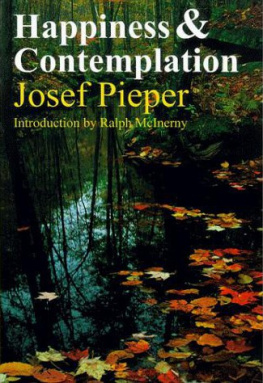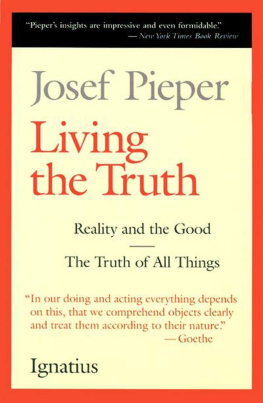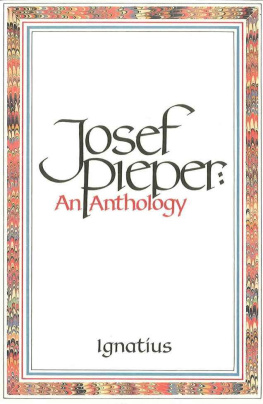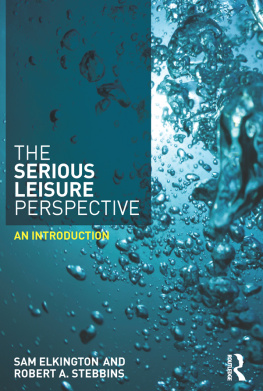LEISURE THE BASIS OF CULTURE
~
THE PHILOSOPHICAL ACT
JOSEF PIEPER
LEISURE THE BASIS OF CULTURE
~
THE PHILOSOPHICAL ACT
TRANSLATED BY ALEXANDER DRU
IGNATIUS PRESS SAN FRANCISCO
Original edition:
1952 by Pantheon Books, Inc.
English translation 1963 by Random House, Inc.
All rights reserved
Published by arrangement with Pantheon, an imprint of
the Knopf Doubleday Publishing Group,
a division of Random House, Inc.
Cover photograph by
Christina Hanck / istockphoto
Cover design by Roxanne Mei Lum
Foreword 2009 by Ignatius Press, San Francisco
All rights reserved
ISBN 978-1-58617-256-5 (PB)
ISBN 978-1-68149-291-9 (EB)
Library of Congress Control Number 2007942856
Printed in the United States of America
CONTENTS
FOREWORD
BY JAMES V. SCHALL, S.J.
When a culture is in the process of denying its own roots, it becomes most important to know what these roots are. We had best know what we reject before we reject it. If we are going to build a chair, the first thing we need to know, above all else, is what a chair is. Otherwise, we can do nothing. We are not a culture that never understood what a human being was in his nature and in his destiny.
Rather we are a culture that, having once known these things, has decided against living them or understanding them. Indeed, we have decided to reject most of them, almost as an act of defianceas an act of pure humanismas if what we are is not first given to us. We have let an empty future that we propose to make by our own standards become the ideal over and against a real past that revealed to us what man really was and is: namely, a being open to wonder who did not create himsel for the world in which he dwells.
This little book by the German philosopher Josef Pieper is simply a gem. No book its size will teach us so many true things about everything we need to know to understand what and why we are or about how to live a life worth living. This book is one of the first I recommend for waking us up to what life is all about, to what is essential to and glorious about our lives. Pieper, through his writing, gives us the quiet assurance that he knows what is important. He has an uncanny command over the way to bring reality to our attention in a manner that makes it ours yet leaves it as it is.
This book contains two related essays that Pieper gave in Bonn in 1946. The first is on the classic notion of leisure, what we do when all elsepolitics, economics, daily dutiesis done. The second essay is on what it means to philosophize. Augustine said that there is no other reason for men to philosophize but to be happy. Pieper would agree with this. The second essay is often overlooked, but it contains the profoundest insights about the nature of philosophy, its self-understanding, and its relation to theology.
Both essays belong together. Man has the power to know all that is. This is what his mind gives him. Yet he still knows himself as a finite being by knowing what is not himself. This is the importance of the philosophic life. It is for its own sake; yea, it is even useless because it is not for something else other than its own delight in knowing the truth. No short essay will teach the reader what his knowing powers are about better than Piepers Philosophic Act. Few have ever had such an act explained at all, let alone so well.
Originally, these essays were written with the background of World War II and its aftermath. Here, Pieper was already quite aware that the first principle of action is the end for which we act. If we get this source of action wrong, our efforts to achieve our end will go wrong. When read today, these essays now stand against the background not only of World War II and then of the decline of Marxism, but also of the absolutization of democracy and the resurrection of Islam. A world once thought to be automatically prosperous is suddenly thrown back on its essentials.
At first sight, it seems that something, almost anything, must be done about our situation. But it is the genius of Pieper to see that this activist, busy motion is the wrong starting point. Before we can pretend to do anything about the present, we must know what we are, what the world is, and yes, what God is. Construction of a civilization that knows little or nothing of these deeper realities can only make things worse.
In a world in which German writers are not always known as models of clarity, Josef Pieper writes with a concise, comprehensible style. In the briefest manner, his writings always show his familiarity with the great thinkers of our tradition. He does not always agree with them, but he always learns from both their mistakes and their insights. He tells what each is. Pieper does not begin with modernity and the presumption that what the classics and medievals held made no difference. Indeed, knowing little or nothing before Machiavelli or Descartes is a formula for philosophical incoherence. In a surprising way, every book of Piepers is a short treatise on the whole of philosophy and its history. In his writings, Pieper is a great teacher, even for the beginner. His audiences are those eager to find the truth, indeed those eager to know that there is a truth. Pieper is the great antidote to philosophical skepticism and to sophistry in every form.
What is at issue in the word leisure, a famous Greek word from which we get the word school, is both an inner worldly and a transcendent understanding of the highest things. Following Aristotle, we realize that something divine lies in our knowing of what is. We are not simply to devote ourselves to politics and economics or to making a living, however valid these are in their own spheres. Pieper is quite aware of these things as elements in human life. But he recognizes that when everything human is defined in terms of utility or pleasure, the enterprise of knowing what we are loses its centrality in our lives. There are things beyond politics and without which politics cannot be politics.
Pieper is remarkably good in explaining to us that our minds are open to a reality that is not ourselves; in fact we stand in wonder and amazement at what is not ourselves. Much modern science has tried to tell us that there is nothing out there to find. All we do, it is said, is project ourselves. Pieper will have none of this blindness. He understands the shortcomings of an epistemology that would close us off from reality, including our own reality. More importantly, he makes us aware that we stand in a gift relation to what is not ourselves. What is closer to our existence is not the power we project out onto the world but the reality itself that is a gift to us. About reality we wonder how we should be grateful and to whom.
Piepers famous little book is a short philosophy course discovered by those fortunate few who read him, a book often found by chance. This book exists in a world that knows little of philosophy as it was originally understoodas a love of wisdom, a love of what is. None of us are gods who presumably are already wise: we are but men who wonder, who seek to know for no other reason than the knowing itself.
Pieper is amazing in the way that he finds brief, pithy statements about his point from Aquinas, Plato, Goethe, Aristotle, and others. From Disputed Questions on the Virtues by Aquinas, Pieper is fond of saying that contemplative life is not properly human but superhuman. St. Thomas even says that homo naturaliter non est humanus sed superhumanus est, so that things that are human point to what is beyond human nature. Pieper understands that this reality of mans actual being impinges on our lives and thought in such a way that, by being what we are, we become both better philosophers and better human beings.
Leisure the Basis of Culture and The Philosophical Act are together very brief. Together they cannot be matched as an introduction and explication of what we are. They teach us the two greatest things about ourselves: that we did not cause ourselves to be and that we cannot but be amazed and grateful that what we are actually exists in our own persons and in the companions we find in this mortal life, itself destined not just to itself but to eternal life. Other books may also teach us this, but no book will do it quite so well.
Next page
